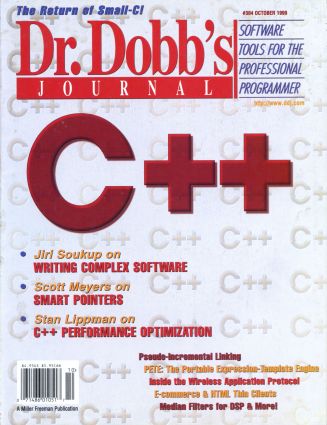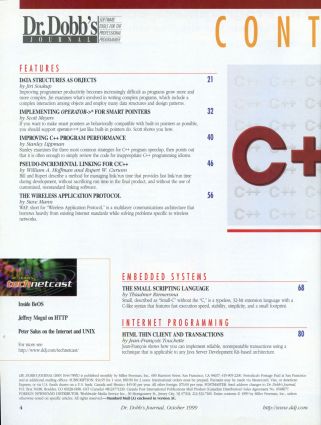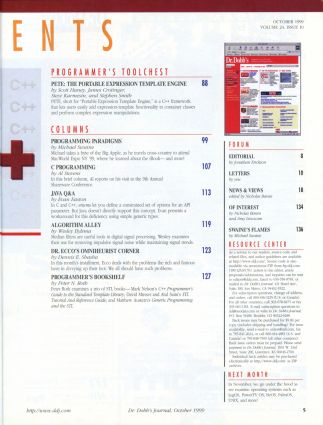
p.8 EDITORIAL
[author : Jonathan Erickson] #Edito
TABLE OF CONTENTS
FEATURES
p.21 DATA STRUCTURES AS OBJECTS
[author : Jiri Soukup]
Improving programmer productivity becomes increasingly difficult as programs grow more and more complex. Jiri examines what's involved in writing complex programs, which include a complex interaction among objects and employ many data structures and design patterns.
p.32 IMPLEMENTING OPERATOR->* FOR SMART POINTERS
[author : Scott Meyers]
If you want to make smart pointers as behaviorally compatible with built-in pointers as possible, you should support operator->* just like built-in pointers do. Scott shows you how.
p.40 IMPROVING C++ PROGRAM PERFORMANCE
[author : Stanley Lippman]
Stanley examines the three most common strategies for C++ program speedup, then points out that it is often enough to simply review the code for inappropriate C++ programming idioms.
p.46 PSEUDO-INCREMENTAL LINKING FOR C/C++
[author : William A. Hoffman and Rupert W. Curwen]
Bill and Rupert describe a method for managing link/run time that provides fast link/run time during development, without sacrificing run time in the final product, and without the use of customized, nonstandard linking software.
p.56 THE WIRELESS APPLICATION PROTOCOL
[author : Steve Mann]
WAP, short for "Wireless Application Protocol," is a multilayer communications architecture that borrows heavily from existing Internet standards while solving problems specific to wireless networks.
EMBEDDED SYSTEMS
p.68 THE SMALL SCRIPTING LANGUAGE
[author : Thiadmer Riemersma]
Small, described as "Small-C" without the "C," is a typeless, 32-bit extension language with a C-like syntax that features fast execution speed, stability, simplicity, and a small footprint.
INTERNET PROGRAMMING
p.80 HTML THIN CLIENT AND TRANSACTIONS
[author : Jean-François Touchette]
Jean-François shows how you can implement reliable, nonrepeatable transactions using a technique that is applicable to any Java Server Development Kit-based architecture.
PROGRAMMER'S TOOLCHEST
p.88 PETE: THE PORTABLE EXPRESSION TEMPLATE ENGINE
[author : Scott Haney, James Crotinger, Steve Karmesin, and Stephen Smith]
PETE, short for "Portable Expression Template Engine," is a C++ framework that lets users easily add expression-template functionality to container classes and perform complex expression manipulations.
COLUMNS
p.99 PROGRAMMING PARADIGMS
[author : Michael Swaine]
Michael takes a byte of the Big Apple, as he travels cross-country to attend MacWorld Expo NY '99, where he learned about the iBook — and more!
p.107 C PROGRAMMING
[author : Al Stevens]
In this brief column, Al reports on his visit to the 9th Annual Shareware Conference.
p.113 JAVA Q&A
[author : Evan Easton]
In C and C++, enums let you define a constrained set of options for an API parameter. But Java doesn't directly support this concept. Evan presents a workaround for this deficiency using simple generic types.
p.119 ALGORITHM ALLEY
[author : Wesley Bylsma]
Median filters are useful tools in digital signal processing. Wesley examines their use for removing impulsive signal noise while maintaining signal trends.
p.123 DR. ECCO'S OMNIHEURIST CORNER
[author : Dennis E. Shasha]
In this month's installment, Ecco deals with the problems the rich and famous have in divvying up their loot. We all should have such problems.
p.127 PROGRAMMER'S BOOKSHELF
[author : Peter N. Roth]
Peter Roth examines a trio of STL books — Mark Nelson's C++ Programmer's Guide to the Standard Template Library; David Musser and Atul Saini's STL Tutorial And Reference Guide; and Matthew Austern's Generic Programming and the STL.
FORUM
p.10 LETTERS
[author : you]
p.18 NEWS & VIEWS
[author : edited by Nicholas Baran]
p.134 OF INTEREST
[author : Nicholas Baran and Amy Lincicum]
p.136 SWAINE'S FLAMES
[author : Michael Swaine]

